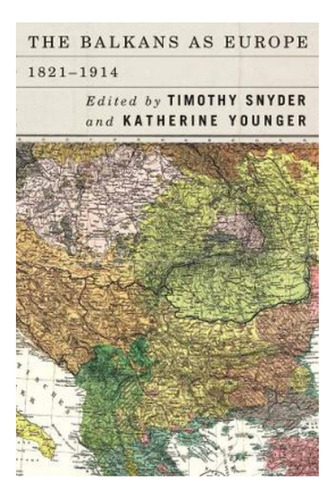The Balkans As Europe, 1821-1914 - Timothy Snyder. Eb6
Llega gratis el sábado 13 de julio
Retirá gratis entre el 15 y el 18/jul en correo y otros puntos
Ver en el mapaDisponible 45 días después de tu compra
MercadoLíder | +500 ventas
MercadoLíder Gold
+500
Ventas concretadas
Brinda buena atención
Medios de pago
Hasta 12 cuotas sin tarjeta
Tarjetas de crédito
Tarjetas de débito
Efectivo



Descripción
Somos una librería que se dedica a traer libros importados, trabajamos con los principales proveedores internacionales y editoriales, siendo nuestros libros originales y asegurando la calidad del mismo.
Una vez realizada la compra el proveedor envía el libro a nuestro deposito para su despacho, una vez despachado se envían los datos para su seguimiento.
Brindamos garantía sobre nuestros libros y MercadoLibre asegura su dinero hasta que reciba el libro de conformidad.
EL COSTO DE ENVIO ES GRATIS. SE REALIZAN ENVIOS A TODO EL PAIS.
El plazo de entrega del libro hasta su puerta es de 29 días aproximadamente.
Contamos con gran catalogo de libros, si no lo tenemos publicado lo conseguimos.
Cualquier duda o consulta estamos a su disposición.
ESMERALDA BOOKS.
Descripción: Focusing on state formation and the identity-geopolitics relationship, makes the case that the Balkans were at the forefront of European history in the century before World War I. Focusing on state formation and the identity-geopolitics relationship, makes the case that the Balkans were at the forefront of European history in the century before World War IThis collection of essays places the Balkans at the center of European developments, not as a conflict-ridden problem zone, but rather as a full-fledged European region. Contrary to the commonly held perception, contributors to the volume argue, the Balkans did not lag behind the rest of European history, but rather anticipated many (West) European developments in the decades before and after 1900. In the second half of the nineteenth century,the Balkan states became fully independent nation-states. As they worked to consolidate their sovereignty, these countries looked beyond traditional state formation strategies to alternative visions rooted in militarism or national political economy, and not only succeeded on their own terms but changed Europe and the world beginning in 1912-14. As the Ottoman Empire weakened and ever more kinds of informal diplomacy were practiced on its territory by morepowerful states, relationships between identity and geopolitics were also transformed. The result, as the contributors demonstrate, was a phenomenon that would come to pervade the whole of Europe by the 1920s and 1930s: the creeping substitution of ideas of religion and ethnicity for the idea of state belonging or subjecthood. CONTRIBUTORS: Ulf Brunnbauer, Holly Case, Dessislava Lilova, John Paul Newman, Roumiana Preshlenova, Dominique KirchnerReill, Timothy Snyder Timothy Snyder is Richard C. Levin Professor of History at Yale University. Katherine Younger is a research associate at the Institute for Human Sciences (IWM) in Vienna, Austria.
Preguntas y respuestas
¿Qué querés saber?
Preguntale al vendedor
Nadie hizo preguntas todavía. ¡Hacé la primera!
